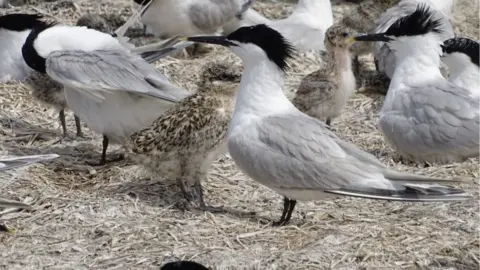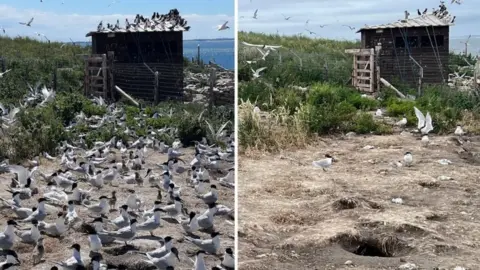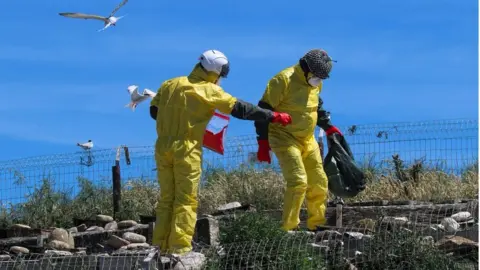Coquet Island: Wardens welcome late arrival of sandwich terns
 RSPB
RSPBThe late arrival of 250 sandwich tern nests with healthy adults and chicks has been welcomed at a breeding colony off the Northumberland coast.
Thousands of seabirds have been wiped out after bird flu hit the population at Coquet Island last month.
Among the affected seabirds are the rare roseate terns, which use the island as their only UK nesting spot.
RSPB warden Paul Morrison said although the late comers' arrival was a mystery, it did offer a "glimmer of hope".
 Ibrahim Alfarwi
Ibrahim AlfarwiMr Morrison added: "It's bittersweet as the population of sandwich terns here was virtually wiped out just weeks ago but this late influx has come from somewhere else and they've been clever in nesting away from the death area.
"They obviously think Coquet Island is a safe haven, and some of the sandwich tern chicks are still growing, and it could be another week before they're ready to go, as the adult terns have a biological time clock and they can just fly off."
It is thought the sandwich terns may have arrived from Europe, as the birds can travel huge distances in a day, and while some are ringed, wardens have not attempted to get a closer look.
"It's very late in the season and we are hoping their chicks are fully fledged before they leave," Mr Morrison said.
 RSPB
RSPBThe island hosts colonies of roseate, sandwich, arctic and common terns, as well as gulls, kittiwakes and puffins.
While adult puffins and kittiwakes have been largely unaffected by bird flu, the virus has had a major effect terns and their chicks.
Staff and volunteers at the seabird sanctuary have been collecting dead seabirds on a daily basis, but with no dead birds spotted in the past couple of days, they believe the worst has now passed.
Allow Instagram content?
There have been similar scenes at the nearby Farne Islands where the National Trust has found more than 5,000 dead birds, but estimates 10 times more may have fallen into the sea.
People along the North East coastline have been told not to touch or allow their dogs to go near any dead or sick seabirds they find.
At Coquet, wardens are beginning the operation of cleaning the island ready for next spring.
Mr Morrison said: "We're into a process of a clean down to disinfect the island, all the paths, the stones we use for guide marks and nest boxes, so we've done our utmost to remove infections before the birds return at the end of March."

Follow BBC North East & Cumbria on Twitter, Facebook and Instagram. Send your story ideas to [email protected].
